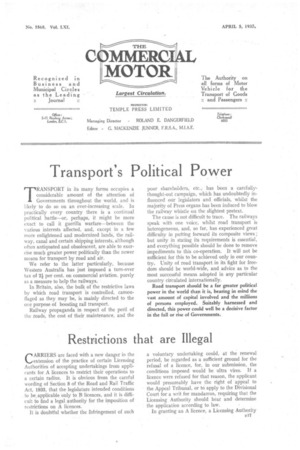Transport's Political Power
Page 35

If you've noticed an error in this article please click here to report it so we can fix it.
TRANSPORT in its many forms occupies a considerable amount of the attention of Governments throughout the world, and is likely to do so on an ever-increasing scale. In practically every country there is a continual political battle—or, perhaps, it might be more exact to call it guerilla warfare—between the various interests affected, and, except• in a few more enlightened and modernized lands, the railway, canal and certain shipping interests, although often antiquated and obsolescent, are able to exercise much greater power, politically than the newer means for transport by road and air.
We refer to the latter particularly, because Western Australia has just imposed a turn-over tax of 2i per cent. on commercial aviation, purely as a measure to help the railways.
In Britain, also, the bulk of the restrictive laws by which road transport is controlled, camouflaged as they may be, is mainly directed to the one purpose of boosting rail transport.
Railway propaganda in respect of the peril of the roads, the cost of their maintenance, and the i poor shareholders, etc., has been a carefullythought-out campaign, which has undoubtedly influenced our legislators and officials, whilst the majority of Press organs has been induced to blow the railway whistle on the slightest pretext.
The cause is not difficult to trace. The railways speak with one voice, whilst road transport is heterogeneous, and, so far, has experienced great difficulty in putting forward its composite views ; but unity in stating its requirements is essential, and everything possible should be done to remove impediments to this co-operation. It will not be sufficient for this to be achieved only in our country. Unity of road transport in its fight for freedom should be world-wide, and advice as to the most successful means adopted in any particular country circulated internationally.
Road transport should be a far greater political power in the world than it is, bearing in mind the vast amount of capital involved and the millions of persons employed. Suitably harnessed and directed, this power could well be a decisive factor in the fall or rise of Governments.




































































































